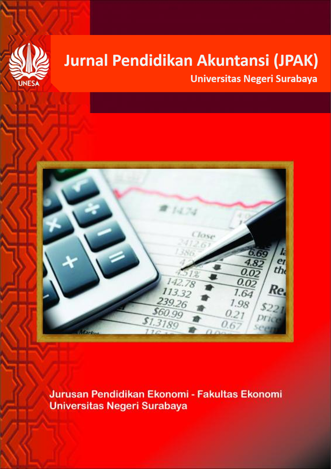Inovasi Pembelajaran Praktikum Akuntansi Perusahaan Jasa Dagang Berbasis Entrepreneur Project untuk Menyongsong Kampus Merdeka
DOI:
https://doi.org/10.26740/jpak.v10n1.p60-68Keywords:
Learning innovation; entrepreneur project; accounting practicumAbstract
This study aims to generate and analyze the feasibility of a learning innovation design in the Entrepreneur Project-based Accounting Practicum for Trading Service Companies for students of the Accounting Education Study Program, State University of Surabaya. This research is included in the type of research and development or called Research and Development (R&D) model IDI (Instructional Development Institute) which was adapted from the University Consortium Instructional Development and Technology (UCIDT). The data analysis used is a descriptive statistical approach. The IDI development model that the researcher uses applies three major stages, namely defining, developing, and evaluating. The instrument used is an expert validation sheet. The results of this study are the design of learning innovations for accounting practicum courses for trading companies based on entrepreneur projects in one semester which have been validated with the results getting a good rating of 57.1% and a very good rating of 42.9%. This means that it can be concluded that the innovation of accounting practicum learning for trading service companies based on the entrepreneur project can be declared feasible to be continued at the implementation stage.
Downloads
References
Alifah, F., & Sutirna. (2019). Pembelajaran Matematika Berbasis Wirausaha. Prosiding Seminar Nasional Matematika dan Pendidikan Matematika.
Audretsch, D., & Keilbach, M. (2004). Entrepreneurship and Regional Growth : An Evolutionary Interpretation. Jurnal of Evolutionary Economics, 14, 605-616.
Dainuri. (2019). Kontribusi Pendidikan Entrepreneurship : Suatu Upaya Konstruktif Menumbuhkan Jiwa Wirausaha pada Mahasiswa. Journal of Sharia Economics, 1(1), 1-13.
Direktorat Jenderal Perguruan Tinggi. (2020). Buku Panduan Merdeka Belajar - Kampus Merdeka. Jakarta: Direktorat Jenderal Perguruan Tinggi Kemdikbud RI.
Farida, E., Djatmika, E. T., Siswoyo, B. B., & Witjaksono, M. (2017). Pengembangan Model Pembelajaran Kewirausahaan Berbasis Proyek untuk Menumbuhkan Semangat Wirausaha Mahasiswa Prodi Pendidikan Ekonomi IKIP PGRI Bojonegoro. Jurnal Pendidikan Ekonomi dan Kewirausahaan, 1(1), 8-18.
Frinces, Z. (2010). Pentingnya Profesi Wirausaha di Indonesia. Jurnal Ekonomi dan Pendidikan, 7(1).
Fuadi, T., & Aswita, D. (2021). Merdeka Belajar Kampus Merdeka (MBKM) : Bagaimana Penerapan dan Kendala yang Dihadapi oleh Perguruan Tinggi Swasta di Aceh. Jurnal Dedikasi Pendidikan, 5 (2) , 603-614.
Gafur, A. (2001). Desain Intruksional (Suatu Langkah Sistematis Penyusunan Pola Kegiatan Belajar dan Mengajar). Solo: Tiga Serangkai.
Indonesia, K. P. (2018). Indonesia Butuh 4 Juta Wirausaha Baru untuk Menjadi Negara Maju. Kemenperin.
Jayani, D. (2019). Peringkat Kewirausahaan Indonesia Nomor Dua terendah di ASEAN. US News and World Report.
Khamimah, W. (2021). Peran Kewirausahaan dalam Memajukan Perekonomian Indonesia. Jurnal Disrupsi Bisnis, 4(3), 228-240.
Mueller, P. (2006). Exploring the Knowledge Filter : How Entrepreneurship and University-Industry Relationship Drive Economic Growth. Research Policy, 35, 1499-1508.
Mulyani, E. (2014). Pengembangan Model Pembelajaran Berbasis Projek Pendidikan Kewirausahaan untuk Meningkatkan Sikap, Minat, Perilaku Wirausaha, dan Prestasi Belajar Siswa SMK. Jurnal Ilmiah Pendidikan, 33(1), 50-61.
Noor, A. (2013). Pembelajaran Bermakna untuk Mencapai Pendidikan Karakter. Anterior Jurnal, 12 (2), 54-60.
Novia, D. (2017). Pentingnya Mahasiswa Belajar Praktik. https://www.republika.co.id
Republik Indonesia. 2003. Undang-Undang Republik Indonesia Nomor 20 Tahun 2003 tentang Sistem Pendidikan Nasional. Kementerian Pendidikan, Kebudayaan, Riset, dan Teknologi. Jakarta.
Rohayati. (2014). Pengaruh Pembelajaran Berbasis Proyek terhadap Hasil Belajar dan Jiwa Kewirausahaan Siswa SMA Negeri 2 Magelang. Semarang: Universitas Negeri Semarang.
Romo, M. J., Romero, D., & Molina, A. (2013). Entrepreneurship-Based Learning : A New Teaching Technique for Active-Learning Oriented to Multi-disciplinary Groups.
Siregar, N., Sahirah, R., & Harahap, A. (2020). Konsep Kampus Merdeka Belajar di Era Revolusi Industri 4.0. Journal of Islamic Education, 1 (1), 141-157.
Sugiyono. (2013). Metode Penelitian Pendidikan Pendekatan Kuantitatif Kualitatif dan R&D. Bandung: Alfabeta.
Wardhani, J. P., Riani, A. L., & Susilaningsih. (2018). Pembelajaran Kewirausahaan Berbasis Proyek. Surakarta: Prosiding Seminar Nasional Pendidikan Administrasi Perkantoran (SNPAP).
Downloads
Published
How to Cite
Issue
Section
License
Authors who publish with this journal agree to the following terms:
- Authors retain copyright and grant the journal right of first publication with the work simultaneously licensed under a Creative Commons Attribution License that allows others to share the work with an acknowledgement of the work's authorship and initial publication in this journal.
- Authors are able to enter into separate, additional contractual arrangements for the non-exclusive distribution of the journal's published version of the work (e.g., post it to an institutional repository or publish it in a book), with an acknowledgement of its initial publication in this journal.
- Authors are permitted and encouraged to post their work online (e.g., in institutional repositories or on their website) prior to and during the submission process, as it can lead to productive exchanges, as well as earlier and greater citation of published work (See The Effect of Open Access).

Jurnal Pendidikan Akuntansi (JPAK) is licensed under a Creative Commons Attribution-NonCommercial 4.0 International License.
 Abstract views: 571
,
Abstract views: 571
, PDF Downloads: 546
PDF Downloads: 546



